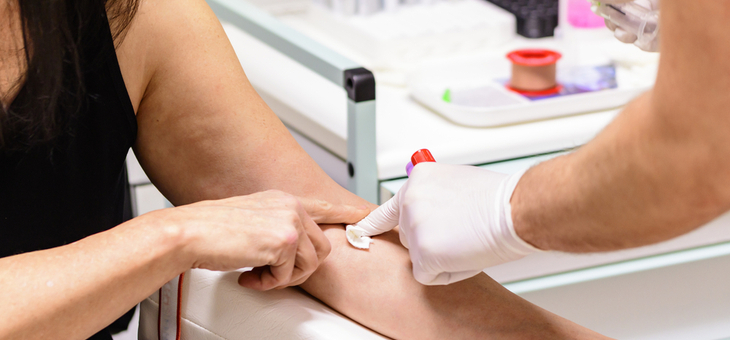One blood test could detect 50 forms of cancers if the trial of a liquid biopsy undertaken by the British National Health Service (NHS) is successful.
Lord David Prior, chair of NHS England, says the multi-cancer detection trial offers hope that a wide range of conditions can be diagnosed earlier and “fundamentally change the outlook for people with cancer”.
The multi-cancer early detection blood test will be trialled with 165,000 UK participants from mid-2021. The pilot program will involve 140,000 people older than 50 with no signs of cancer, and 25,000 people aged 40 and above showing signs of the disease. Data from the pilot will determine whether the test expands to one million people in 2024 and 2025.
The Galleri liquid biopsy test, developed by US company GRAIL, can “detect a range of different biomarkers which are shed by tumours and circulated in bodily fluids, including the blood”, reports technologynetworks.com.
“Earlier detection of cancer offers arguably the single biggest opportunity to save lives from the disease, and tests like GRAIL’s have great transformative potential,” said Michelle Mitchell, chief executive at Cancer Research UK.
“Large research studies of these tests are essential for determining if they’re effective, and a vital step in getting them to patients, if proven to work.
Sir Harpal Kumar, president of GRAIL Europe, described Galleri as a “ground-breaking and potentially life-saving advance” that could have “tremendous human and economic benefit”.
Professor David Cunningham, from The Royal Marsden, said the test could be a game-changer for detecting cancer earlier.
Jodie Moffat, head of early diagnosis at Cancer Research UK, says the trial must demonstrate the test can detect very small amounts of abnormal DNA circulating in the blood for it to be useful in diagnosing early stage cancer.
“Because the amount of circulating tumour DNA tends to increase as a cancer becomes more advanced, these types of blood tests have tended to be better at detecting later stage disease than early stage disease,” Dr Moffat said.
She is encouraged by promising results from other studies, which have picked up a large number of cancers.
“However, sample sizes have been small for some cancer types, and follow-up has been limited for patients who did not receive a positive test,” Dr Moffat said.
Paul Pharoah, professor of cancer epidemiology at the University of Cambridge, questioned the aims of the pilot study, saying there was no published evidence that the test was effective for screening for cancer. He says randomised, controlled trials are required to evaluate a screening test.
The New Daily reported that in a 2019 trial of the test involving 15,000 participants, the detection rate for the 12 most deadly cancers at an early stage was 67.3 per cent.
“The blood test becomes more accurate as the cancer progresses through the four stages. Overall detection levels (sensitivity of the test) were 34 per cent, 77 per cent, and 84 per cent respectively, for stages I, II and III.
“In a sub-study published in March, the test was able to specify the organ where the cancer was growing with 93 per cent accuracy and delivered an overall false-positive rate of less than 1 per cent using a single blood sample.
“It was this sub-study that identified more than 50 cancer types.”
The NHS says by checking for molecular changes, the test can identify many types of cancer previously considered difficult to detect early, including head and neck, ovarian, pancreatic, oesophageal and some blood cancers.
“If the NHS program shows the test also works as expected for people without symptoms, it will be rolled out to become routinely available.
“The test could help meet the NHS Long Term Plan goal of increasing the proportion of cancers caught early, which can be the key to reducing cancer mortality. Patients whose condition is diagnosed at ‘stage one’ typically have between five and 10 times the chance of surviving compared with those found at ‘stage four’.”
The NHS says there are additional benefits with early detection of cancer beyond improving survival rates, including enhanced quality of life, reduced cost and complexity of cancer treatments and allowing patients and caregivers time to learn about the disease and plan for the future.”
Cancer is defined as “a disease of the cells, which are the body’s basic building blocks. Cancer occurs when abnormal cells grow in an uncontrolled way. These abnormal cells can damage or invade the surrounding tissues, or spread to other parts of the body, causing further damage”.
Do you feel hopeful that cancer can be better contained in your lifetime?
If you enjoy our content, don’t keep it to yourself. Share our free eNews with your friends and encourage them to sign up.
Related articles:
https://www.yourlifechoices.com.au/health/your-health/cancer-cost-shock-for-private-patients
https://www.yourlifechoices.com.au/health/your-health/prevention/lower-your-risk-of-oral-cancer/
https://www.yourlifechoices.com.au/health/your-health/cancers-left-better-undiscovered

